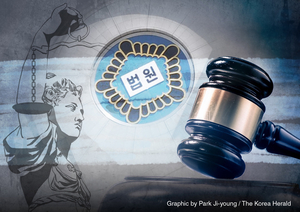Potential landmark ruling says decade of working as flight attendant could have been a factor in plaintiff’s leukemia
 (Graphic by Park Ji-young/The Korea Herald)
(Graphic by Park Ji-young/The Korea Herald) A South Korean court recently ruled in favor of a former flight attendant in an occupational hazard case against the state, ruling that extended exposure to cosmic rays during years of flight is sufficiently relevant to leukemia.
The ruling marked the first time the judiciary branch of South Korea acknowledged that exposure to cosmic rays could cause an “occupational accident,” as defined in the Industrial Accident Compensation Insurance Act.
According to a report by Korean-language daily Kyunghyang Shinmun on Monday, the Seoul Administrative Court sided with the flight attendant in the legal case launched against the Korea Workers’ Compensation and Welfare Service. The plaintiff, who had worked as a flight attendant since 2009, was diagnosed with leukemia in 2019 and claimed the decade of flying led to the cancer.
Cosmic rays, or cosmic radiation, refer to high-energy particles from space that can cause genetic and cytogenetic damage. Some studies suggest that increased exposure to cosmic radiation increases cancer risks, particularly in certain occupations involving air travel.
The K-Comwell, however, rejected the plaintiff’s claims, saying that the plaintiff had accumulated radiation of about 35.02 millisievert, and they had not even worked for a full decade. The annual limit for radiation exposure for a member of the public is 1mSv, and the maximum exposure for a radiation worker is about 20mSv per year.
But the court pointed out that ionizing radiation, a component of cosmic rays, is a carcinogen classified by the International Agency for Research on Cancer. “Radiation can potentially cause harm even in minimal doses. Just because the accumulated amount of radiation did not reach a certain level, it cannot be deemed safe,” the court said in its ruling.
The court added that the plaintiff had frequently worked on long-haul flights, which means they would have been exposed to higher levels of cosmic radiation compared to the average cabin crew member.
Of the plaintiff’s 7,672 hours of service in the air, 4,600 hours were on flights that took at least eight hours.
The court also said that the K-Comwell had already acknowledged cosmic rays as a contributing cause of acute myeloid leukemia in another case involving the death of a flight attendant in 2021. The deceased was exposed to 1.8.67mSv of radiation and flew for 5,571 hours as cabin crew.
Although K-Comwell had recognized the cosmic ray-induced occupational accidents in a handful of past cases, the recent case was the first where such a ruling was made by a court.
Legal representatives of the plaintiff expressed hope that this case would be a yardstick for future decisions by the state-run agency.
minsikyoon@heraldcorp.com
